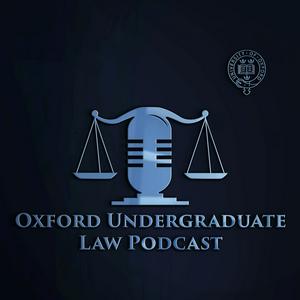30 Episoden
- Many of us scrutinise science and technology much less than we do the law. The field of Science and Technology Studies (STS) directly interrogates this incongruence. An interdisciplinary field, STS sees science and technology not as existing in a vacuum, but as producing types of authorities that can be studied just as much as law. Although science and technology are often treated as higher authorities that the law must follow as it inevitably lags behind, Professor Sheila Jasanoff (founder and director of the Harvard STS Program) rejects this characterisation.
In November 2025, Professor Jasanoff delivered the Oxford Clarendon Law Lecture Series this year, together entitled ‘Science, Technology and the Constitution of Modernity’. The conversation in this episode is separate but complementary to these lectures. The first portion of the episode elucidates the key conceptual ideas pertinent to STS thinking and its relation to law. The latter portion questions the more specific positions Professor Jasanoff has voiced in her works regarding intellectual property, especially in relation to the most recent legal developments, such as the environment, AI, and the concept of personhood.
Each of the Clarendon Law Lectures can be accessed below:
Part 1: https://youtu.be/1pp07pHzGTY?si=Op27oAPfJp7XdDrd
Part 2: https://youtu.be/QWxI-ybskEE?si=GItwlb0sROgK895C
Part 3: https://youtu.be/8UaHoB8oZic?si=pOwpdY5-bMpE0fMv Climate Change, Ecological Vulnerability, and Piracy: The Legal Regime of Straits in International Law with Professor Nilüfer Oral
09.9.2025 | 40 Min.Straits are incredibly important for international shipping, energy security, and military purposes. However, climate change, ecological vulnerability, and piracy are testing the international legal framework governing the straits used for international navigation around the world. Professor Nilufer Oral discusses these challenges in her paper - 'Navigating the Oceans: Old and New Challenges for the Law of the Sea for Straits Used in International Navigation’. Rachel is honoured to interview her today in a summer guest episode.
Professor Nilufer Oral is Director of the Centre of International Law at the National University of Singapore. Amongst her many accomplishments, she is a member of the UN International Law Commission (ILC) and was the Chairperson of the 74th session of the ILC. She is a Co-chair of the ILC Study Group on sea-level rise in relation to international law, and is currently a Member of the Committee of Legal Experts of the Commission of Small Island States on Climate Change and International Law (COSIS).
Transcript available at: https://rss.com/podcasts/oulp/2207117/#transcript- The jurisdiction of England and Wales has one of the highest numbers of children in detention across Western Europe, and is one of the few jurisdictions in Europe that still has mandatory life sentences for children. Given the frequency and severity of punitive measures levied towards children in England and Wales, it is all the more important that children are adequately represented in sentencing and appeal processes. However, whether this is a reality is a question that Elysia Boon explores in this episode with Dr Laura Janes.
Dr Janes is a consultant solicitor at GT Stewart Solicitors and Scott-Moncrieff and Associates. She specialises in prison law, criminal appeals, mental health law and public law, with a particular focus on representing children, youth and vulnerable people in detention both in penal and mental health settings. She is also the founder of Young Legal Aid Lawyers, holds a professional doctorate in youth justice, and teaches at the London South Bank University. Most recently, she was appointed honorary King’s Council!
Publications and cases referenced/drawn from:
ZA v R [2023] EWCA Crim 596
R v S [2010] EWCA Crim 1462
Children Convicted of Sexual Offences: Do Lifelong Labels Really Help? (The Howard Journal Vol 50 No 2. May 2011)
JF & Anor, R (on the application of) v Secretary of State for the Home Department [2009] EWCA Civ 792
Child appeals (Solicitors Journal: Justice Gap series, 2012)
R (on the application of M) v Chief Magistrate [2010] EWHC 433 - The definition of disability is primarily governed by the Equality Act 2010. One is considered to have a disability if they have a physical or mental impairment that has a ‘substantial’ and ‘long-term’ negative effect on one’s ability to do normal daily activities. The law as it relates to disability affects a range of social interactions, from discrimination to a duty to make reasonable adjustments, and conversations surrounding it primarily focus on ethical considerations and the legal decisions themselves. However, an often-forgotten aspect of disability law is the terminology legislation and the judiciary specifically use to describe and label disability, which has profound impact on how people understand and treat people with disabilities.
In this episode, Elysia interviews Dr Heloise Robinson, Singer Fellow in Law at the University of Oxford. Dr Robinson is interested in the philosophical foundations that inform the law, with a special focus on legal and ethical issues surrounding the selection against disability, including in relation to eugenics, and to gender equality. Her work has been published in leading law and bioethics journals, such as the Modern Law Review, Legal Studies, the Journal of Medical Ethics, and the Cambridge Quarterly of Healthcare Ethics.
Publications referenced/drawn from:
Robinson H, Herring J. Naming and Describing Disability in Law and Medicine. Camb Q Healthc Ethics. 2024 Jul;33(3):401-412. doi: 10.1017/S0963180123000609. Epub 2024 Jan 2. PMID: 38163993.
Robinson, H. (2023). Discrimination in Abortion Law and the Message the Law is Sending: R (Crowter) v Secretary of State for Health and Social Care. The Modern Law Review, 87(1), 218–230. https://doi.org/10.1111/1468-2230.12831. Accessed from: https://onlinelibrary.wiley.com/doi/10.1111/1468-2230.12831. - With President Donald J. Trump's recent inauguration, the US election has been on everyone’s mind, but there are some equally important upcoming elections in 2025 and 2027 just south of the border.
It is no secret that the Mexican judiciary is in dire need of reform and that the appetite to rid the system of corruption has never been greater. It cannot be said, however, that the reforms proposed by Manuel Lopez Obrador do anything to address these concerns. At their very best, they are a noble but misguided attempt to enact the much-needed change for which the majority of Mexicans voted. At their very worst, these proposals are an attempt to increase the power of the executive by decreasing the ability of one of the key organs of the state, the judiciary, to check the actions of the Government: the hallmark of authoritarianism.
In this episode, Jake interviews Luz Orozco y Villa, legal scholar and author of “The Dangerous Path of Mexico’s Judicial Reform: What is at Stake for Judicial Independence in the Americas.” Luz is a Dphil (PhD) in Law candidate at the Faculty of Law. Her research lies at the intersection of constitutional law and emerging technologies. Supervised by Professor Jacob Rowbottom, her doctoral thesis focuses on the constitutionalisation of the digital environment, specifically the case of online service providers regarding content moderation. Prior to joining Oxford, Luz worked as a career clerk for the Mexican Supreme Court of Justice and as a research advisor at the Gender Equality Program of the Federal Judicial Council. She has taught International Human Rights Law, Philosophy of Human Rights, Family Law, and Gender Justice to undergraduate law students at different universities. She completed an LL.M. from Columbia Law School (New York City, NY, USA) as a Fulbright scholar and an LL.B from Instituto Tecnológico Autónomo de México (Mexico City, Mexico). Luz is currently the co-convener of the Future of Technology and Society Discussion Group.
Publications referenced/drawn from:
L Villa, 'The Dangerous Path of Mexico’s Judicial Reform: What is at Stake for Judicial Independence in the Americas' (Oxford Human Rights Hub, 9 August 2024) <https://ohrh.law.ox.ac.uk/the-dangerous-path-of-mexicos-judicial-reform-what-is-at-stake-for-judicial-independence-in-the-americas/>. In particular at 26:13 and 36:56.
09:29 and 17:45- A Spitalier, 'Justice Denied: The Case for Judicial Reform in Mexico' (Wilson Center, 5 September 2024) <https://www.wilsoncenter.org/article/justice-denied-case-judicial-reform-mexico>.
11:35- C Parra and R Heckel, 'The 2024 Judicial Reform in Mexico: On the Erosion of Democratic Checks and Electoral Manipulation' (Verfassungsblog, 22 September 2024) <https://verfassungsblog.de/judicial-reform-mexico/>.
19:53- T Mattiace, 'AMLO's Judicial Reform Overlooks the Key Weakness of Mexican Justice. Americas' (Human Rights Watch, 8 August 2024) <https://www.hrw.org/news/2024/08/08/amlos-judicial-reform-overlooks-key-weakness-mexican-justice>.
21:11- R (on the application of Finch on behalf of the Weald Action Group) (Appellant) v Surrey County Council and others (Respondents) [2024] UKSC 20 {21} per Lord Leggatt.
Weitere Bildung Podcasts
Trending Bildung Podcasts
Über Oxford Undergraduate Law Podcast
Hosted by the Oxford University Undergraduate Law Journal’s Podcast Editors, Chum Sdiq, Isaac Tan Kah Hoe, and Bonnie Yeo, and managed by Vice-Editor Yvette Young, the Oxford Undergraduate Law Podcast explores the law, its relationship with society, and its impact on everyday life. The OULP aims to bring academic legal discussion to a wider audience and is brought to you by the Oxford University Undergraduate Law Journal, with the kind support of Crown Office Chambers.For more information, discussion and academic publications on the issues discussed in our Podcast episodes, visit our Podcast’s webpage at https://www.law.ox.ac.uk/ouulj/oxford-undergraduate-law-podcast. For the accompanying blog posts and legal discussions on other topics, visit the OUULJ Blog at https://www.law.ox.ac.uk/ouulj/blog. Automated transcripts are available for certain episodes at https://rss.com/podcasts/oulp/.
Podcast-WebsiteHöre Oxford Undergraduate Law Podcast, Gehirn gehört - Prof. Dr. Volker Busch und viele andere Podcasts aus aller Welt mit der radio.at-App

Hol dir die kostenlose radio.at App
- Sender und Podcasts favorisieren
- Streamen via Wifi oder Bluetooth
- Unterstützt Carplay & Android Auto
- viele weitere App Funktionen
Hol dir die kostenlose radio.at App
- Sender und Podcasts favorisieren
- Streamen via Wifi oder Bluetooth
- Unterstützt Carplay & Android Auto
- viele weitere App Funktionen


Oxford Undergraduate Law Podcast
Code scannen,
App laden,
loshören.
App laden,
loshören.







































